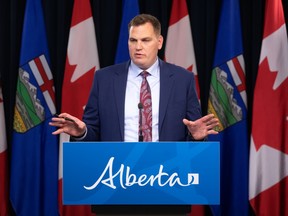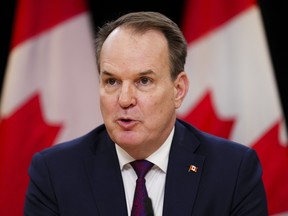Politics
Alberta Government Targets Election Integrity with New Legislation

Alberta’s Conservative government is planning to introduce new legislation aimed at safeguarding the province’s electoral system from disruptions caused by the Longest Ballot Committee (LBC). The announcement, made by House Leader Joseph Schow on October 16, 2023, follows a recent incident in the federal riding of Battle River-Crowfoot, where more than 200 candidates were nominated for an August by-election, leading to significant complications for Elections Canada.
The LBC, known for its unconventional tactics, has been accused of flooding ballots with frivolous candidates. This move was facilitated by a 2017 ruling from Justice Avril Inglis of the Alberta Queen’s Bench, which deemed the requirement for candidates to pay a deposit unconstitutional. The rationale behind the deposit was to deter frivolous candidacies; however, the court found that it primarily excluded candidates unable to afford the requisite $1,000 deposit.
Following this ruling, the LBC exploited the absence of deposit requirements to increase the number of candidates on ballots. The only remaining barriers to candidacy were the collection of signatures from local residents and the appointment of an official agent. The LBC circumvented these regulations by recruiting individuals willing to endorse multiple candidates, often using the same signatures for various nominations.
Recently, Kieran Szuchewycz, one of the group’s founders, defended the LBC’s actions during a session of the House of Commons procedure committee. The discussion highlighted concerns regarding the legality of the LBC’s signature-gathering techniques. Michael Cooper, a Conservative MP, engaged Szuchewycz in a heated debate, questioning the ethical implications of their methods.
The LBC’s supporters argue for the need to transfer election design authority from Parliament to an “independent, non-partisan” body. This desire stems from a perceived conflict of interest among Members of Parliament (MPs) in setting electoral rules. However, critics point out that the LBC’s practices raise equally significant concerns about conflicts of interest when providing the same official agent to multiple candidates.
The Alberta government’s response to the LBC’s tactics has garnered mixed reactions. Schow’s assertion that election candidates should be individuals who “truly care and are serious about representing a community” has attracted skepticism and criticism from various quarters. Critics argue that such statements could lead to further barriers for candidacy and could be perceived as an attempt to restrict democratic participation.
As discussions continue, options for reinforcing the electoral framework remain uncertain. Potential measures could include limiting the number of candidates a nominator can support or requiring distinct election agents for each candidate. While these ideas are being explored, critics warn that implementing such changes could become complicated and resource-intensive.
A widely discussed solution is the reinstatement of election deposits, which proponents argue would effectively deter frivolous candidacies. The prospect of a financial commitment from candidates could significantly reduce the number of insincere nominations. However, the legal implications of such a move remain contentious, particularly in light of the previous court ruling declaring deposits unconstitutional.
If the Alberta government moves forward with reintroducing election deposits, advocates suggest that they should also consider making them forfeitable if candidates fail to achieve a minimal vote threshold. This approach would not only serve to discourage insincere candidates but would also reaffirm the legitimacy of the electoral process.
As Alberta navigates these challenges, the implications for the province’s democratic integrity are profound. Ensuring that the electoral system remains robust against attempts to exploit it will require careful consideration and possibly new legal frameworks. The outcome of these legislative efforts could set a precedent for how electoral systems are managed across the country.
-

 World3 months ago
World3 months agoScientists Unearth Ancient Antarctic Ice to Unlock Climate Secrets
-

 Entertainment3 months ago
Entertainment3 months agoTrump and McCormick to Announce $70 Billion Energy Investments
-

 Lifestyle3 months ago
Lifestyle3 months agoTransLink Launches Food Truck Program to Boost Revenue in Vancouver
-

 Science3 months ago
Science3 months agoFour Astronauts Return to Earth After International Space Station Mission
-

 Technology2 months ago
Technology2 months agoApple Notes Enhances Functionality with Markdown Support in macOS 26
-

 Top Stories1 week ago
Top Stories1 week agoUrgent Update: Fatal Crash on Highway 99 Claims Life of Pitt Meadows Man
-

 Sports3 months ago
Sports3 months agoSearch Underway for Missing Hunter Amid Hokkaido Bear Emergency
-

 Politics3 months ago
Politics3 months agoUkrainian Tennis Star Elina Svitolina Faces Death Threats Online
-

 Technology3 months ago
Technology3 months agoFrosthaven Launches Early Access on July 31, 2025
-

 Politics3 months ago
Politics3 months agoCarney Engages First Nations Leaders at Development Law Summit
-

 Entertainment3 months ago
Entertainment3 months agoCalgary Theatre Troupe Revives Magic at Winnipeg Fringe Festival
-

 Politics2 weeks ago
Politics2 weeks agoShutdown Reflects Democratic Struggles Amid Economic Concerns





















